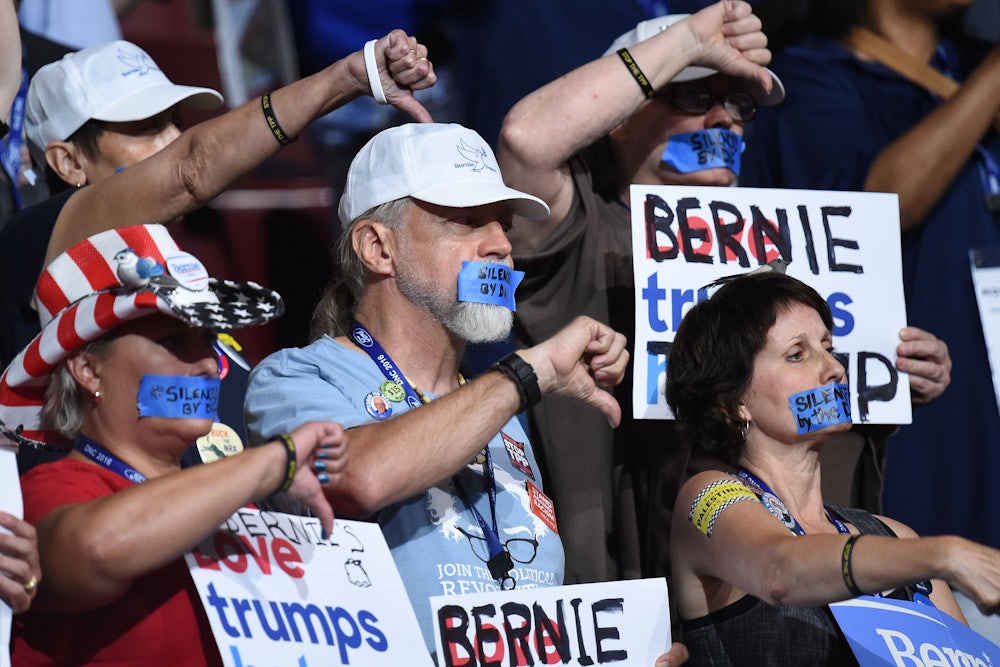Bernie Sanders’s fans stepped on his big line. According to prepared remarks of his speech at the Democratic National Convention on Monday night, Sanders was supposed to say, “By these measures, any objective observer will conclude that—based on her ideas and her leadership—Hillary Clinton must become the next president of the United States. The choice is not even close.” But when Sanders said Clinton “must become” president, the crowd burst into sustained applause.
This might seem like a positive sign, an indication that Sanders had accomplished his mission of bringing his people over to Clinton. But then the crowd started chanting “Bernie, Bernie,” so he aborted the following line—“The choice is not even close”—and jumped to the next sentence.
This foreshortened endorsement is a perfect metaphor for the strange emotional rollercoaster that was the first day of the convention. A small cohort of die-hard Sanders supporters were booing, often at inappropriate times, throughout the proceedings. This vocal cult seems to have been a cluster of a few dozen people, mostly in the California delegation. But what this group lacked in numbers, they made up for in noise. They yelled out “Black Lives Matter” when Cory Booker (one of two sitting black senators) gave his fired-up speech. They yelled “We Trusted You” when Elizabeth Warren spoke, implying she betrayed her values by backing Clinton.
Their chants during Sanders’s speech were more positive and approving, but did have the effect of drowning out part of his message. The question is whether these last holdouts of the “Bernie or Bust” movement can be converted even by Bernie. One answer might be that this is so small a group that they don’t matter. After all, a recent survey showed that 95 percent of Sanders supporters prefer Hillary Clinton to Trump. Maybe we should just follow Sarah Silverman’s example and dismiss this last remnant as “ridiculous.”
But the stakes in this election are so high that the Democrats should want to get out every possible vote—and the greater danger is that the Sanders people will sit out the election, not that they will vote Trump.
By contesting the Democratic primary for its entirety, and holding out on endorsing Clinton until he was able to influence the Democratic platform, Sanders was able to bring meaningful change to the party. The side effect is that some of supporters can’t let go.
Thus, Sanders has become Clinton’s most important surrogate, the one person who can not only defuse any lingering anti-Clinton animosity but also energize his base enough to go to the polling stations. Monday night’s speech, despite occasionally being interrupted by chants of “Bernie, Bernie,” is a good start for the process of converting the Sanders revolution into the Clinton campaign. Sanders repeatedly mentioned Clinton’s name and praised her as a strong progressive who shared his agenda.
The latter half of his speech was all about Clinton:
- “Hillary Clinton understands that if someone in America works 40 hours a week, that person should not be living in poverty. She understands that we must raise the minimum wage to a living wage.”
- “Hillary Clinton will nominate justices to the Supreme Court who are prepared to overturn Citizens United and end the movement toward oligarchy in this country.”
- “Hillary Clinton wants to see that all Americans have the right to choose a public option in their health care exchange.”
- “Hillary Clinton also understands that millions of seniors, disabled vets and others are struggling with the outrageously high cost of prescription drugs...”
- “Hillary Clinton understands that we have to invest in education and jobs for our young people, not more jails or incarceration.”
“Hillary Clinton understands that our diversity is one of our greatest strengths.”
Sanders concluded by saying that “Hillary Clinton will make an outstanding president.” The question now is: Will his supporters stop chanting his name long enough to listen to him?
